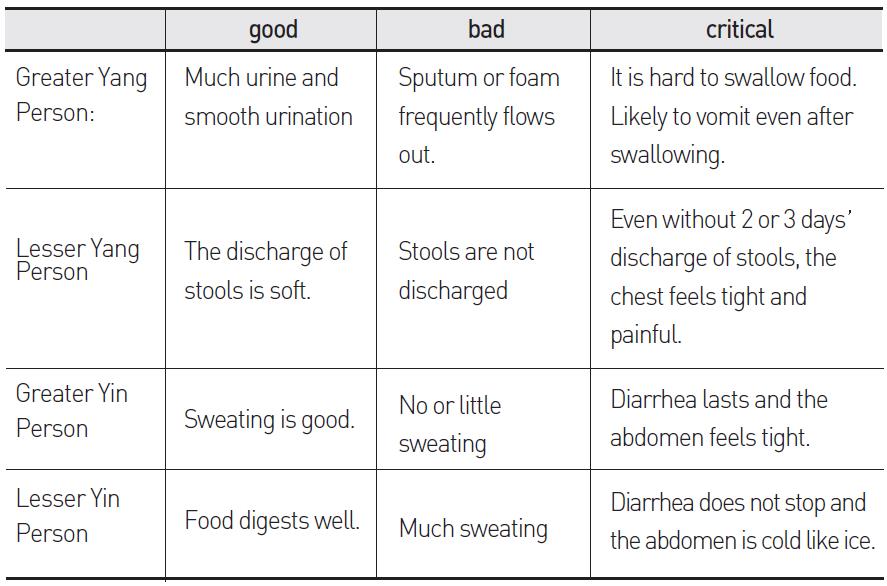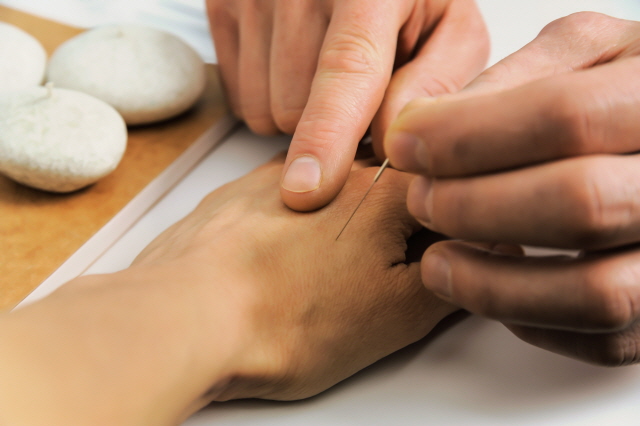itten by Jeonghwa Lee, Choonjae Lee, Published by Korea Institute of Oriental Medicine
Four-Constitution Medicine is a constitutional medicine that categorizes people into four types – greater yang, greater yin, lesser yin and lesser yang – and diagnoses and treats diseases, according to the person’s constitution.
This type of medicine is one branch of TKM, and was initiated by Lee Je-ma, a Confucian of the late Joseon, of the late 19th century; Korea took great pride in this medicine. Lee discovered constitutional medicine, while making strenuous efforts to cure his own illness.
His theory grasps the large differences between the functions and characteristics of the viscera and bowels. This helps the doctor to analyze and observe the patient’s appearance, disposition, disease pattern, etc., categorize the constitution, and then present a treatment method for the appropriate constitution.
1. Classification by Appearance
1) Greater Yang Person:
- clear-cut in features and not fat
- big in the head and the scruff of the neck
- well-developed in the upper parts of the chest
- small in buttocks and slim the waist
- instable in a standing posture due to weak legs
- hard to walk or stand long due to a weak lower part of the body
2) Lesser Yang Person
- seemingly imprudent due to quickness of speech and deportment
- developed and full in the part of the chest
- poor in buttocks and seemingly lonely in a sitting posture
- swift of foot due to the lightness in the lower part of the body
- big in the eyes and cheerful in the voice
3) Greater Yin Person
- tall and fat (often thin but sound in the skeleton.)
- week in the scruff of the neck
- big and the hands and feet, and clear-cut in the contour of the face
- full-grown in the waist and steady in a standing posture
- hard in the eyes and hard-featured in the looks
- sweating while eating cold-boiled rice
- drinking cold water although it is cold
4) Lesser Yin Person
- small and thin in build and weak in form
- the upper part of the body is developed in a more balanced way than the lower part. usually short
- weak and seemingly lonely in the posture around the chest
- many people walk with their head drooped
- big in buttocks and stable in a sitting posture
- generally good-looking – little sweating – averse to cold food
2. Classification by Disposition
1) Greater Yang Person:
- decisive but likely to be dictatorial
- sociable but likely to get angry when things fall short of his / her expectation
- tries always to move forward, not step back. bold, positive and manly
- has his / her own way in everything and doesn’t repent. self-righteous, almost planless and not minute
2) Lesser Yang Person:
- cheerful and brisk
- open and candid, full of the spirit of chivalry and service
- week in endurance, likely to get tired of everything and give up readily
- good at planning and promotion. active and confident in everything
- always anxious lest something should go wrong because he or she tends to start businesses too readily
- short-tempered and likely to bring business to a successful end, rather than a good beginning
- apt to conduct business impulsively regardless of public or personal affairs
3) Greater Yin Person:
- generally not talkative and active in sports
- steady, calm and strong in a desire for accomplishment
- never gives up – careful and thoughtful
- conservative and averse to change. indifferent to others’ business
- tends to cling to one’s own Korea
4) Lesser Yin Person
- fond of contemplation, shy and apt not to express his / her opinion positively
- jealous and unable to reconcile
- docile and calm. circumspect and gentle
- too careful. very anxious
- introspective and has a weak drive
- minute and calm. averse to others’ interference
- likely to live in ease and averse to adventure
3. Classification by Constitution

4. Food Suitable for Constitution
1) Greater Yang Person
- Healthy Food: For a greater yang person, warm food is better than cool food. Low-fat and mild food is recommended, particularly such as sea foods and vegetables. (buckwheat, naengmyeon (cold noodles), shrimp, shellfish, crab, trepang, crucian carp, pine needles, grapes, wild grapes, fruit of Actinidia arguta, leaf mustard, cherry, Chinese quince, persimmon, etc.)
- Harmful Food: Spicy, hot, or fatty foods are not good for health. If he or she enjoys eating food high in calories and protein, he or she is susceptible to such diseases as hepatitis because it imposes a heavy burden on the liver.
2) Lesser Yang Person
- Healthy Food: A lesser yang person has a strong spleen and good digestive power. He or she does not get sick although enjoying cold food and drink, for example naengmyeon (cold noodles), even in midwinter because of the constitutionally febrile spleen and stomach. (fresh cold food, sea foods, barley, red-bean, mung beans, pork, duck, cucumber, oyster, trepang, ascidian, ear shell, shrimp, crab, dried pollack, carp, soft-shelled turtle, snakeheaded fish, flatfish, Chinese cabbage, lettuce, pumpkin, eggplant, carrot, water melon, melon, strawberry, banana, draft beer, ice cakes, etc.)
- Harmful Food: It is good for a person of febrile constitution to abstain from febrile food. (red pepper, ginger, green onion, garlic, pepper, mustard, spicy and stimulating condiments such as curry, chicken, dog, roe deer, goat, honey, ginseng, etc.)
3) Greater Yin Person
- Healthy Food: As he or she is big in the body and has good digestive functions, food high in animal or vegetable protein and heavy in taste is recommended. (wheat, bean, sweet potato, adlay, Indian millet, peanut, green perilla, sugar, brown rice, milk, butter, cheese, beef, liver oil, spawn of pollack, freshwater snail, eel, codfish, brown seaweed, sea tangle, dried laver, chestnut, pine nuts, walnut, gingko nut, pear, Japanese apricot, apricot, plum, rad ish, balloonflower, carrot, Codonopsis lanceolata, bracken, lotus root, taro, hemp, mushroom, etc)
- Harmful Food: As he or she is susceptible to obesity, high-blood pressure or constipation, it is good to abstain from pungent or fatty food. (chicken, dog, pork, samgyetang (chicken broth with ginseng and other ingredients), ginseng tea, honey, ginger, etc.)
4) Lesser Yin Person
- Healthy Food: As he or she is poor in digestive functions and cold in the stomach, digestible and warm food is recommended. Food with pungent condiments promotes appetite and is good for digestion. (warm food, glutinous millet, potato, apple, mandarin orange, tomato, peach, jujube, chicken, dog, roe deer, sparrow, pheasant, sheep, goat, honey, Alaska pollack, sea bream, yellow corvina, anchovy, croaker, loach, spinach, cabbage, dropwort, green opinion, garlic, ginger, red pepper, mustard, pepper, curry, etc.)
- Harmful Food: Indigestible fatty food, cold food or raw food may cause diarrhea. (naengmyeon (cold noodles), melon, water melon, cold milk, ice cakes, draft beer, boiled barley, pork, food made from flour, etc.)
5. Treatment Methods Suitable for Constitution
Size of the Viscera for Constitution
- Greater Yang Person: large lungs and small liver
- Lesser Yang Person: large spleen and small kidneys
- Greater Yin Person: large liver and small lungs
- Lesser Yin Person: large kidneys and small spleen
Greater Yang Person
- Difficult or poor urination makes disease a suspect
- He or she takes exercise due to weakness of the lower part of the body
- Much discharge of urine and stools indicate his or her healthiness
- Facial whiteness indicates his or her healthiness
- He or she is taken ill when in frequent anger or grief
- A hard solar plexus is not good
Lesser Yang Person
- Good discharge of stools indicated his or her healthiness
- He or she is likely to suffer from lumbago due to the weakness of the loins and legs
- Excretive organs, for example, the kidney or the urinary bladder, are susceptible to disease due to poor functions of the urogenital organs
- He or she is affected by summer due to his or her constitutional fever
Greater Yin Person
- Good sweating indicated his or her healthiness
- He or she is susceptible to skin diseases such eczema or urticaria, colitis and hemorrhoids
- He or she is susceptible to a hear disease, high-blood pressure, paralysis, bronchitis, asthma, etc.
Lesser Yin Person
- Good digestion indicate his or her healthiness
- Much sweating is not good
- Cold food may cause diarrhea

































